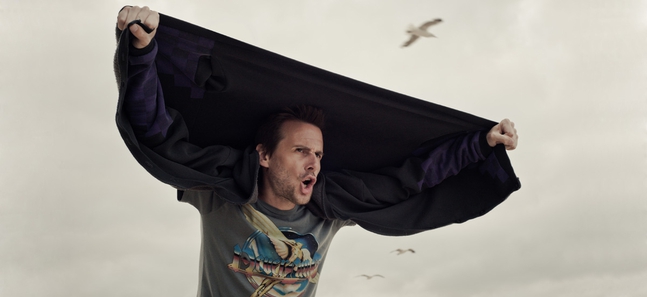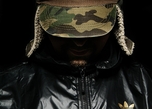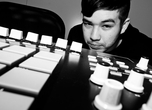Clark: the interview
The Warp Records producer waxes ‘Iradelphic’ on the eve of his Tokyo trip

Posted: Tue Apr 10 2012
Chris Clark has been staying up late again. When Time Out calls the British electronica producer and Warp Records wunderkind at his home in Berlin, he admits that he's just pulled an all-nighter working on new music. 'I haven't really slept much,' he says. 'It'll add spice to the interview.'
Clark (who these days prefers to go simply by his last name) is due to arrive in Japan later this month, when he'll appear alongside label mate Squarepusher and a bevy of knob-twiddlers at the two-day SonarSound Tokyo festival. It'll be one of his first chances to showcase material from new album Iradelphic, which exchanges the clobbering sonics of 2008's Turning Dragon and its 2009 follow-up, Totems Flare, in favour of fingerpicked acoustic guitars, retro synthesizers and collaborations with one-time Tricky vocalist Martina Topley-Bird. In the hands of a lesser producer, this kind of stylistic detour might make for a grimly vanilla listen, but Iradelphic is anything but. What it actually ends up recalling is Body Riddle, the 2006 album that's widely regarded as Clark's masterpiece – even if its creator thinks it's far from perfect himself...
I'm presuming that this all-night session wasn't a one-off. Are you constantly producing music?
Yeah, I am. All the time. It's kind of annoying that I'm so possessed by it sometimes, because I sort of miss out on other things in life. I probably shouldn't talk about stuff that isn't the album, but I've just been stitching loads of analogue wave stuff together, and I've sort of got another idea for an album – which is really cool. I didn't think I would. It's kind of like the more music you release, the more pressure you're under to better each bit of work, and I think I put quite a lot of pressure on myself. But when you get those breakthroughs, it's amazing: it's like the best feeling ever.
It's quite tempting to see Iradelphic as a reaction against the last two albums you did. Do you think that would be accurate?
Yeah, I think that's very accurate. I keep on sort of stressing that I didn't intend it to be like that – I think it's because quite often you only really realise what it means after you've finished a piece of work. So it wasn't really like a conscious effort to go against Turning Dragon and Totems Flare, but, looking back on it now, it's got a definite colour and warmth to it. And I think with Turning Dragon and Totems Flare, it was all about dominating machines and pushing stuff as loud as it could go – still retaining a harmonic, emotional core, but really burying it in distortion and loudness. And you can only go so far with that, really. So it is a kind of antidote to those records, in a way.
Did you feel like you'd taken those ideas as far as they could go?
I did, yeah. In terms of my own body of work, I don't know how I could get more brutal than Totems Flare. I wanted the kind of frequencies and production to cut through and be really precise and cold, and quite harsh in a way. And that's just not a sustainable model for music making. I mean, there's certainly elements of Iradelphic that are still quite – I don't know the word – noisy, I guess…
It has that kind of crunchiness in places, I thought…
Yeah. But I think, with Totems Flare and Turning Dragon, there was a lot of this kind of skipping between different ideas within tracks, lots of jump cuts and so on, and they just weren't as considered as they are on Iradelphic. 'Com Touch', for instance, it kind of changes a lot, but it just took so long to decide – between how many bars something should be, to a matter of seconds. It might sound flippant to some people's ears because there's a lot in all of the tracks to take on board, but it's very deliberate. But, you know, I can't convince you of that: you have to really like the music or you don't, I guess.
To my ears, it sounded like you'd taken some of what you were doing on Body Riddle – the way that you incorporated acoustic sounds into some of the tracks on that album – and pushed it further on this one.
Yeah, in retrospect, the PR and presentation of Body Riddle was kind of milking it on the "this is an instrumental album" front, because it was so treated. There are live drums on it, but… [Iradelphic] feels like the record that Body Riddle should've been, really. It's kind of weird talking about your own work, but that's the album that people seem to think is The One. But I personally think it's really flawed, Body Riddle.
In what way?
It hasn't got as much of a flow. 'Com Touch' is almost like 'Herzog', but it's not as fiddly: it's more direct, and it's got a drop in it and percussion, whereas with 'Herzog' I just really over-egged it. (Pauses) I shouldn't really say all of this. I'm being very self-critical… If I'm being honest, the first track on Iradelphic hasn't got that kind of flair that 'Herr Barr' has. I really didn't want to do an album that started with a bombastic, big gesture, because my last three albums have done that, and you just can't repeat yourself like that. I thought I'd take a chance and have this tiny little guitar vignette – which was actually like a seven-minute prog track initially. It had these really dodgy fusions of guitar and drum machines, and it was a mess, it was a total mess. I'm quite glad no-one's heard that one.
In some of your old interviews, you've mentioned accumulating tons of recordings that never see the light of day. Are the fresh approaches that you try on Iradelphic actually things that you've done before, but just never released?
A lot of it is very old. The first part of 'The Pining' is about five years old, 'Henderson Wrench', the first track, is about four years old, and 'Ghosted' is really old. I just started them, and I didn't really have the vision to finish them. There was a really early mix of 'The Pining', and it was the first time I'd tried layering drums and guitar, and that was a total abortion as well. And then I just kind of revisited it and redid it, and it all flowed really easily and came together. If you've got a track that you've had in your head for four years, it's kind of durable. There's a lifespan to it – at least for me, anyway. Those are the kind of tracks that I think are really rewarding to finish.
On Iradelphic and Totems Flare, you've embraced slightly more traditional song structures and incorporated vocal melodies. Was that something that you've been doing for a while?
Yeah, I've been using my voice as an instrument for the last seven years, just on tracks, but I always tend to take it off at the end. I'm aware that my voice isn't the greatest singing voice, it's just a kind of background usually. There were a lot of vocals on Iradelphic that I took off. The only ones I left on were for 'Ghosted', and I'm happy with that take – lyrically, I'm really happy with it. Working with Martina [Topley-Bird] was a real eye-opener: I thought it was a normal thing to do thirty takes of one lyric line, because that's kind of how I work. But then she was just checking her Facebook, and I'd be like, "Are you gonna sing?" and in two seconds, she'd just nail ten takes, and they're all good in different ways. Working with her was very humbling, really. I think I'd rather work with other vocalists in the future.
Was she somebody who you'd known for a while already?
No, not at all. We'd never met each other before, but we just really clicked. She's got an incredible voice and we've got quite a similar melodic sensibility, I think. It's just weird, because we're from totally different backgrounds. I didn't want to collaborate with someone who was in my sphere of craft, like another techno producer. It's always much more challenging to do that. I quite like thinking of weird collaborations – like, a good one would be Clipse and Scott Walker.
Sorry… did you say Clipse and Scott Walker?
Yeah, that'd be good. Just seeing them in the room together.
I can't imagine that at all!
(Totally deadpan) Yeah, it's kind of weird, isn't it? Because I've got really broad tastes. It's a kind of madness, isn't it, taste in music? I really like Scott Walker and I really like Clipse, but they're just from such different worlds. I think that's why I've never really pursued DJing, because it would just fall flat on its face. I don't know how to kind of plunder a musical ghetto.
That's an interesting way to look at it...
Some people are really good at it. It's a total skill. I mean, I do the odd mix here and there, but I just end up going back to the same records.
You did do a lot of club sets after Body Riddle, right?
Yeah, I did. I've kind of rinsed my current setup, because I used to do it with just two MPCs, but I've invested in loads more analogue gear. That's what I've been doing for the last two days, and preparing a new set, and it's just so much more fun. I think the thing with performing – that a lot of people don't twig – is that the less you're doing, the more nervous you get. All of my worst gigs have been when I haven't had that much to do, but if you can just fully go for it and absorb yourself in stuff, then that's where it's at.
They've got you scheduled for a nighttime slot at SonarSound rather than a daytime one. How do you think that's going to go down? I'm assuming it's not going to be as pulverising as the one you played when you were at Womb a few years ago.
Oh, Christ, yeah, that was pretty pulverising. I don't know – I can't really tell, because I've started three new tracks already that link into album ones, so I just don't know what the set's going to be like. With all the stuff I'm using, you can change tempo at the push of a button, so at the moment I'm just kind of doing 160BPM booty stuff, and then going into drones and then going into hip hop, and I'm fairly convinced that's not a cohesive live set.
Did you find this kind of thing a challenge when you first started playing out?
I did at first. Obviously because I was a young, slightly arrogant 20-year-old, I thought: Yeah, I can get away with playing anything, and if I get bored of it I'll just stop it and play something else, and if people don't like it then fuck them. That was kind of my attitude. It's very different now, though, because I think – just getting feedback from people I've trusted – it was a real problem in my early sets that they were very jumpy, and kind of stop-starty. Which is a better problem to have than drawing stuff out interminably, but there's a definite art to creating a flow, isn't there?
They've done a deluxe reissue of your 2001 debut, Clarence Park, in Japan to coincide with the release of Iradelphic. How do you feel going back to that album?
I had loads of tracks knocking around that were of that era, and it's really weird to hear, because it feels like a different person on one level, and then you can sort of recognise traces of you in there. I'd never write music like that now. It was quite good to revisit it, and selecting tracks to put on there, because you realise that you've got periods in your work: you can trace it over a decade, and there are these certain obsessions that you can hear that you had. But then on the other level, it's like a sort of diary from when I was 20, and I've just let the whole world see it. That makes you feel, "Why did I do that?" It's definitely the album of a young person.
Do you ever get the sense, listening back to old material, that you wouldn't actually be able to make something like that now?
Yeah, totally. After Clarence Park and Empty the Bones of You, I knew that I'd never be able to do a 'Diesel Raven' track again, so there's no point in trying. You've just got to move on and try and cover new ground as much as you can – it's utterly pointless just to try and revisit something that you can no longer do. Of course you can't, because you're in a completely different headspace. I think if I'd heard Iradelphic and someone said to me, "You're gonna write that in ten years", I think I'd be chuffed. I'd also be freaked out, because it sounds like a different person.
Do you get the sense of there being any continuity, or certain key elements, that pop up throughout your work?
I don't know… It's hard to pin down, because there's so much range. And that's not always a good thing, to have this huge range of what you do – I think that's something I'm more aware of now. There's definitely a certain ambiguous, moreish feeling that I get from my tunes, and I just can't leave them alone, really. They've always got to be attended to. When I did Clarence Park, I'd just finish a track in a day, but now I've got about 50 things on the go. I think a lot producers are quite hard on themselves, and feel like they need to finish something quickly because they need to capture some essence, but I've never really had a problem in going back to stuff. I know a few producers who get quite down if they don't finish something in three days or whatever. But then you've gotta have both: I really like knocking tracks up in two minutes and then deleting the files so you've just got it on tape. I like doing that as well, that's a good process. And then you've got your tracks that take four years. You've gotta do both, I think.
Clark plays at SonarSound Tokyo 2012 on April 21. Iradelphic and Clarence Park are out now on Warp Records/Beat Records. www.sonarsound.jp
Tweets
- About Us |
- Work for Time Out |
- Send us info |
- Advertising |
- Mobile edition |
- Terms & Conditions |
- Privacy policy |
- Contact Us
Copyright © 2014 Time Out Tokyo














Add your comment